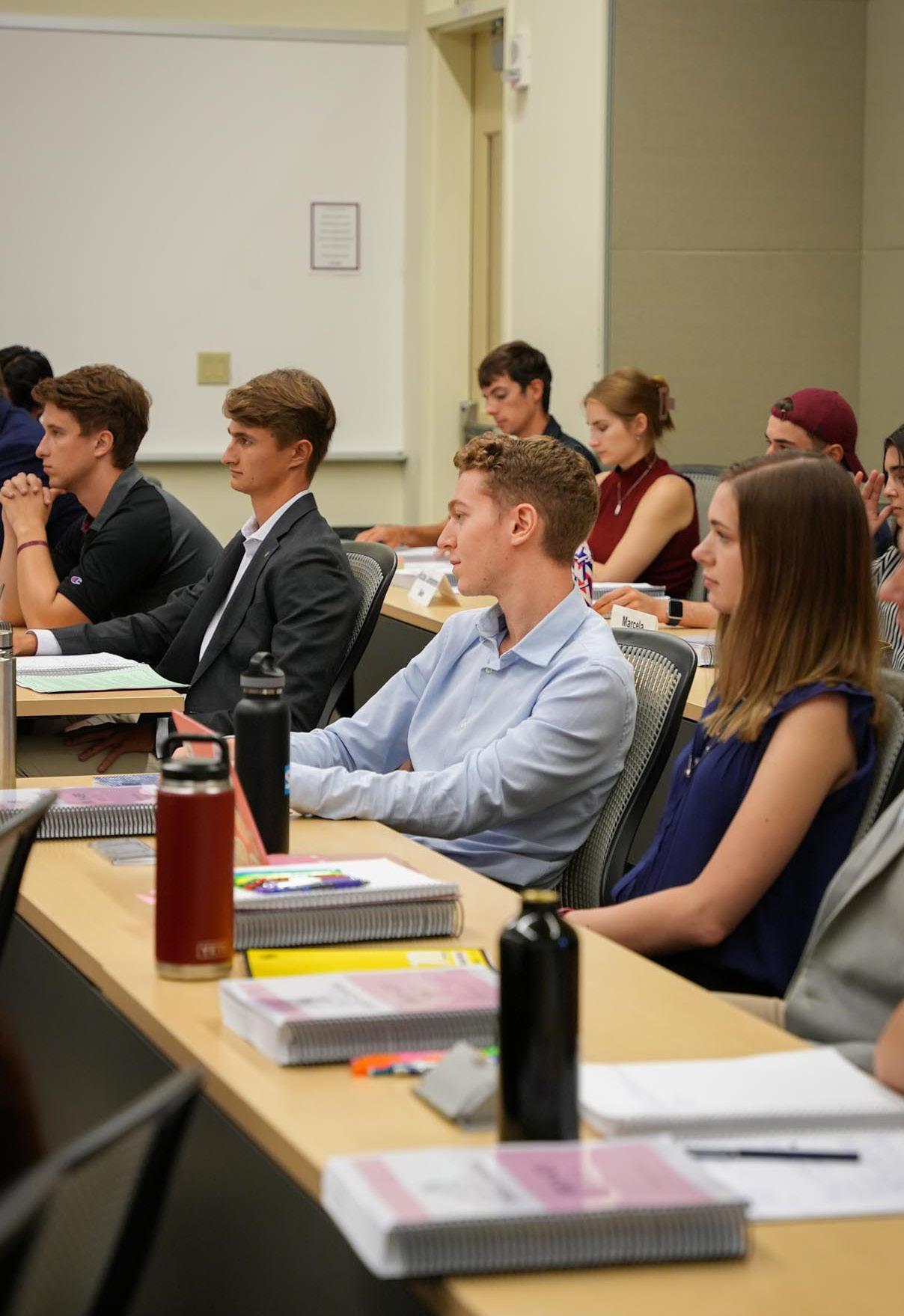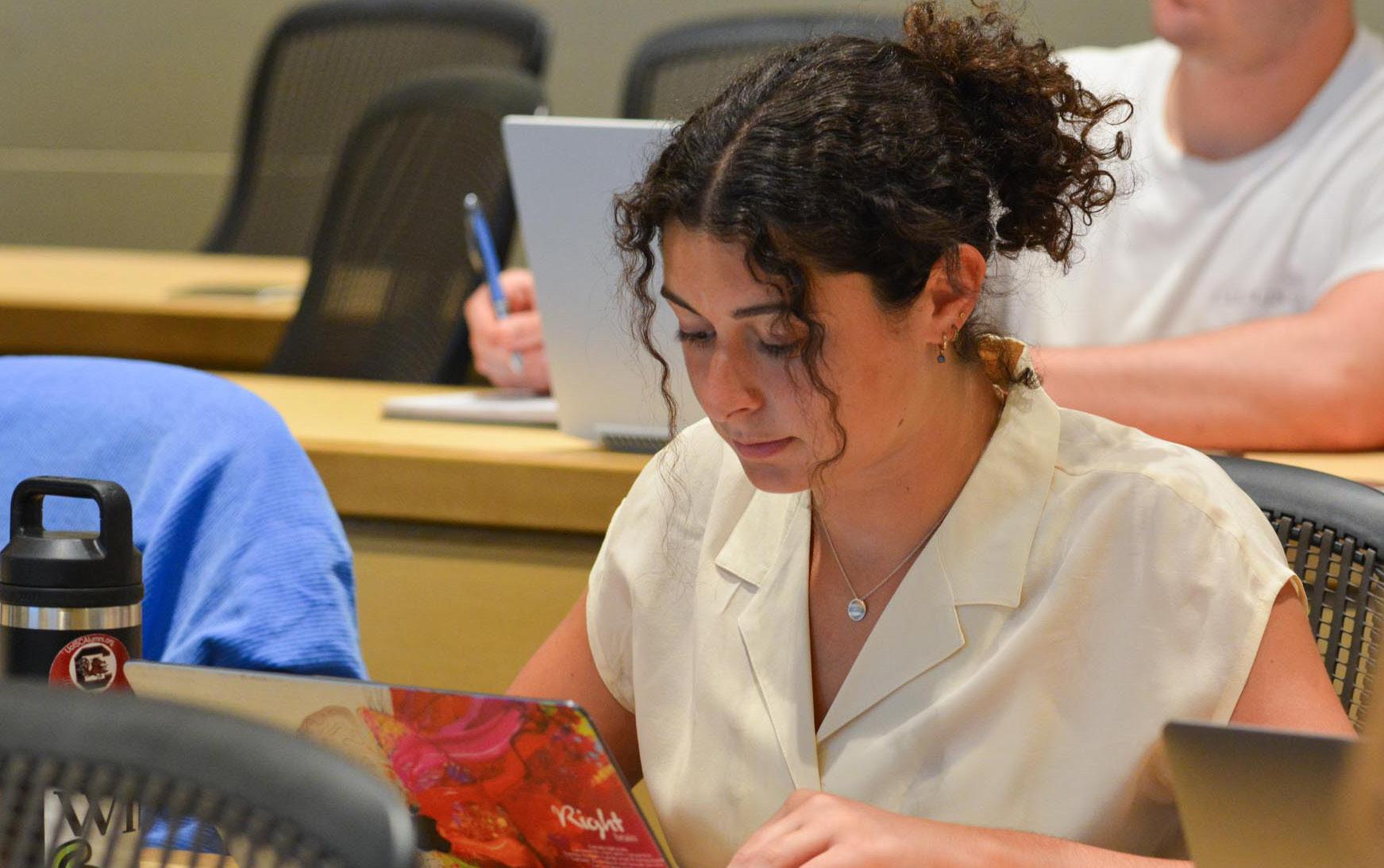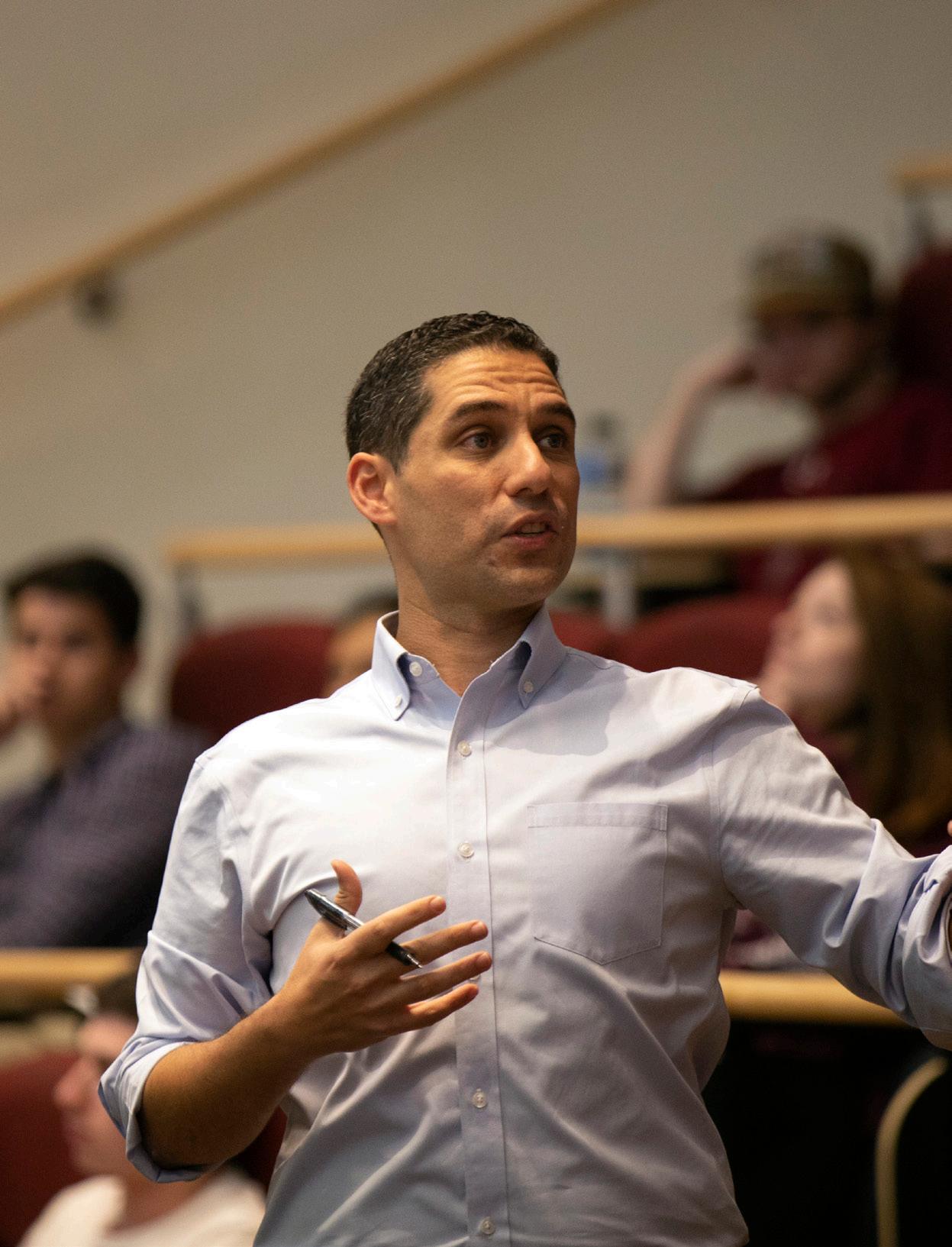DARLA MOORE SCHOOL OF BUSINESS
2025 UNDERGRADUATE MAJORS REPORT

2025 UNDERGRADUATE MAJORS REPORT
STUDENT DATA COLLECTION
All data in this report is collected via a standardized National Association of Colleges and Employers (NACE) online survey, a link to which is emailed to every graduate Being student entered, all data is self-reported Responses from the 2024–2025 survey were gathered from 1,477 graduates in the following classes: August 2024, December 2024 and May 2025 The survey had a response rate of 49 15% (726 respondents) This placement data is as of Aug 13, 2025, and final placement numbers can be found on the sc edu/moore website on Oct 1, 2025
When comparing NACE self-reported salary data with salary data from the U S Department of Education College Scorecard, similar trends emerge regarding which fields of study and/or majors lead to higher salaries for both individual and double major concentrations Notably, the average salary of graduates with federal debt in the College Scorecard data is approximately 20% lower than the average salary obtained from selfreported Moore School data Learn more about the College Scorecard at collegescorecard .ed .gov .
AVERAGE SALARY $64,905
THE ACCOUNTING MAJOR
AT THE DARLA MOORE SCHOOL OF BUSINESS
Accounting is a good fit for students who:
• Want to understand business as a whole
• Are good at using information, especially numbers, to solve problems
• Seek a profession that is always in high demand
Potential career pathways include:
• Certified Public Accountant
• Forensic accountant
• Auditor
• Corporate accountant
• Tax accountant
• Government and nonprofit accountant
An accounting degree leads to leadership careers in public or private accounting, budget planning, tax accounting, auditing and consulting Accountants are found in every industry sector and at management and executive levels in almost every company Many accounting majors go on to graduate school or become certified public accountants
Recent graduates have secured jobs at companies that include BDO, Cherry Bekaert, Deloitte, Elliot Davis, Ernst & Young, Grant Thornton, GreerWalker LLP, KPMG, PricewaterhouseCoopers
According to a recent USC Career Center survey, the 2025 average starting salary for Moore School accounting graduates is $73,600
• Faculty who are highly engaged with students both in the classroom and beyond
Major Requirements:
Students pursuing an accounting degree must complete 24 hours, including:
• ACCT 401: Financial Accounting I
• ACCT 402: Cost/Managerial Accounting
• ACCT 403: Tax I
• ACCT 404: Accounting Information Systems I
• ACCT 405: Financial Accounting II
• ACCT 406: Auditing I
• Two additional accounting courses selected from an approved list of electives
Note that these are the 2025–2026 major requirements and are subject to change as the school regularly updates its curriculum in response to the evolving needs of the business community
Accounting Business Analytics Concentration
Students may add the accounting business analytics concentration to their degree This concentration requires three analytics courses Courses applied in the major may not also fulfill concentration requirements
Accounting Beyond the Classroom
Extracurricular areas to enhance your accounting degree include:
• Community Service: Volunteer Income Tax Assistance Program, Beta Alpha Psi, Institute of Management Accountants
• Opportunity and Social Advocacy: Beta Alpha Psi, IMA, Women in Business Council
Employment Rate: 90%
The School of Accounting is distinguished from other large accounting programs nationwide by maintaining:
• Regular student-to-instructor interaction for majors in all upper-division accounting courses
• Rigor throughout the curriculum, with an emphasis on both technical and skill-based learning objectives
• Up-to-date and in-depth curriculum; close ties with leading accounting firms, whose managers regularly provide input that keeps our curriculum current with the evolving needs of the profession
• Global Learning: Some accounting courses (ACCT 426, IBUS 490) include international components in the curriculum
• Peer Leadership: Beta Alpha Psi, IMA, Moore School Student Ambassadors
• Professional Practice: Beta Alpha Psi, IMA, Global Business Council, Alpha Kappa Psi
• Research: Some accounting courses (ACCT 404) include research components in the curriculum
Work in many of these extracurricular areas can contribute to one or more of the paths to Graduation with Leadership Distinction Find out more at sc .edu/about/initiatives/usc_connect .

Accounting Spotlight: Internship Programs
Accounting majors are encouraged to gain hands-on experience in the field by obtaining paid internships in the summers after their junior and senior years Students have the opportunity to offer students a valuable opportunity to preview the accounting profession and learn more about a firm where they would like to work
Students may also obtain a winter internship, which allows them to experience audit and tax season firsthand The winter internship program, which occurs in the spring semester of the final year, is competitive and facilitated by the Moore School’s Office of Career Management Students work for a firm for the first half of the spring semester and then return to campus to complete their course work Students interested in internships should contact Laura Self at laura .self@moore .sc .edu .
THE ECONOMICS MAJOR
Accelerated Bachelor’s/MACC Program
A flexible curriculum, a close-knit family of students and a faculty that prepares graduates for longterm success make the Moore School’s Master of Accountancy program much more than just a master’s degree With the accelerated program, you can complete up to 12 hours that are counted toward both undergraduate and graduate degree requirements, allowing you to complete both degrees in a shorter amount of time than the traditional path As a MACC graduate, you will meet the education requirements for the CPA license and are expected to complete the CPA Exam during the program Contact macc@moore .sc .edu for more information on the accelerated program, including eligibility requirements

AT THE DARLA MOORE SCHOOL OF BUSINESS
Economics is a good fit for students who:
• Enjoy understanding how individuals, businesses and governments make decisions
• Like to think critically and analytically about real-world problems and big-picture trends
• Want to build versatile quantitative and reasoning skills that apply across many industries
• Are considering graduate study in economics, business, law or public policy
Potential career pathways include:
• Business and industry: banking, consulting, insurance, manufacturing, market research and data analytics
• Government: federal, state or local agencies focused on economic development, labor markets, public finance, transportation, environmental policy and regulatory analysis
• Education and research: teaching at the secondary or postsecondary level or working in academic and policy research organizations
Economists play a key role in addressing major societal challenges by contributing to: economic forecasting; policy analysis and program evaluation; investment and market research; budgeting and resource allocation; and cost-benefit and impact studies
Many Moore School economics students go directly to graduate or professional school Recent graduates have attended schools such as Harvard Graduate School of Education, Villanova University School of Law and Georgetown University School of Public Policy Recent graduates have secured jobs at companies that include Bank of America New York Mellon, EverBank, Nucor Steel, Prisma Health, SouthState Bank and Truist
According to a recent USC Career Center survey, the 2025 average starting salary for Moore School economics graduates is $67,708
Students who earn degrees from the Moore School complete the comprehensive business core, while economics students in the College of Arts and Sciences complete more economics and non-business course work
Major Requirements:
All students take two introductory economics courses, Principles of Microeconomics and Principles of Macroeconomics, as part of the business core Students pursuing a business economics degree must also complete 15 hours, including:
• ECON 321: Intermediate Microeconomic Theory
• ECON 322: Intermediate Macroeconomic Theory
• ECON 436: Introductory Econometrics
• Two additional economics courses selected from an approved list of electives
Note that these are the 2025–2026 major requirements and are subject to change as the school regularly updates its curriculum in response to the evolving needs of the business community
Economics Business Analytics Concentration
Sustainability in Business Undergraduate Concentration Students may add the concentrations to their degree
Economics Beyond the Classroom
Extracurricular areas to enhance your economics degree include:
• Community Service: Office of Sustainability, IMPACT @ Darla Moore, Economic Policy Center
• Opportunity and Social Advocacy: Some economics courses (ECON 508) include opportunity and social advocacy components in the curriculum
• Global Learning: Most economics courses include global learning components in the curriculum
• Peer Leadership: Gamecock Economics Society, Omicron Delta Epsilon, Moore School Student Ambassadors, Beta Gamma Sigma business honor fraternity
THE FINANCE MAJOR
• Professional Practice: Proving Ground, business case competitions, Alpha Kappa Psi
• Research: Some economics courses include research components in the curriculum; also through the Economics Scholars Program and Economic Policy Center Work in many of these extracurricular areas can contribute to one or more of the paths to Graduation with Leadership Distinction Find out more at sc edu/about/initiatives/usc_connect

Economics Spotlight: Gamecock Economics Society
For students who want to extend their economics education beyond the classroom or who are interested in networking with fellow students, faculty and members of the business community, the Gamecock Economics Society provides opportunities to do all of that and more In addition to building a stronger sense of community among economics students and providing leadership opportunities for students who serve as its officers, the society regularly shares information with its members about news and trends in the industry and professional development opportunities on campus and beyond
Economics Scholars Program
Students in this program who have demonstrated exceptional performance in essential required coursework are provided with practical data and research opportunities, collaborating with local, state and federal government agencies as well as businesses So far, students have engaged with entities like the Columbia mayor’s office, SC Housing Authority and U S Forestry Department
AT THE DARLA MOORE SCHOOL OF BUSINESS
Finance is a good fit for students who:
• Are comfortable working with numbers
• Enjoy analyzing data for making high-stakes decisions under uncertainty
• Desire a fast-paced career with significant opportunities for success
Potential career pathways include:
• Investment banking analyst
• Corporate finance treasury analyst
• Corporate risk management
• Investment management
• Commercial and retail banking
• Private wealth management
• Financial services consulting
• Management consulting
Recent graduates have secured jobs at companies that include Bank of America, BlackRock, Deloitte, Goldman Sachs, JPMorganChase, Merrill Lynch, Morgan Stanley, Piper Sandler, Truist and Wells Fargo .
According to a recent USC Career Center survey, the 2025 average starting salary for Moore School finance graduates is $66,795
• Peer Leadership: CFIA, Gamma Iota Sigma, Moore School Student Ambassadors, Beta Gamma Sigma business honor fraternity
• Professional Practice: CFIA, Gamma Iota Sigma, Entrepreneurship Club, Alpha Kappa Psi, Gamecock Consulting Club, Applied Analytics Club, Carolina Fund
• Research: Some finance courses (FINA 365, FINA 470) include research components in the curriculum
Employment Rate: 86%
Major Requirements:
Students pursuing a finance degree must complete 15 hours, including:
• FINA 365: Corporate Financial Analysis
• FINA 469: Investment Analysis and Portfolio Management
• FINA 470: Financial Statement Analysis
• Two additional finance electives selected from an approved list Electives are available from the areas of corporate finance, risk management, investment, real estate and banking
Note that these are the 2025–2026 major requirements and are subject to change as the school regularly updates its curriculum in response to the evolving needs of the business community
Finance Business Analytics Concentration
Students may add the finance business analytics concentration to their degree This concentration requires three analytics courses Courses applied in the major may not also fulfill concentration requirements
The Department of Finance at the Moore School is known for its outstanding faculty whose interests range from bank management, corporate restructuring, investment management and fixed income strategies, to risk management and real estate finance
Finance Beyond the Classroom
Extracurricular areas to enhance your finance degree include:
• Community Service: Moneythink, Carolina Finance and Investment Association (CFIA), Gamma Iota Sigma, Alpha Kappa Psi, IMPACT @ Darla Moore
• Opportunity and Social Advocacy: Moneythink, Women in Business Council
• Global Learning: Some finance courses (FINA 341, IBUS 401) include international components in the curriculum
Work in many of these extracurricular areas can contribute to one or more of the paths to Graduation with Leadership Distinction Find out more at sc edu/about/initiatives/usc_connect

Finance Scholars Program
The Moore School is committed to building a solid road map to high-end finance for its best undergraduate finance students The Carolina Finance Scholars program’s mission is to:
• Improve the quality, placement and trajectory of top finance undergraduate students
• Enhance their practical, analytical and technical skill sets
• Provide them direct exposure to well-placed industry professionals, particularly alumni
Through advanced and specialized course work, data source instruction, live case studies with industry partners, career management training, internships and alumni networking, the Finance Scholars program will prepare its undergraduate participants for a career in high-end finance Application is competitive and takes place before the spring semester of sophomore year Students must have taken FINA 363 to apply
Finance Spotlight: Carolina Finance and Investment Association
The Carolina Finance and Investment Association (CFIA) is a student-driven organization that works in conjunction with faculty and alumni to provide the resources necessary for students to achieve their goals of working in top financial positions CFIA features regular guest speakers, trips, educational seminars, resume workshops, interview training, trading competitions, community outreach, social events and a mock fund It’s a great way for students interested in finance to accelerate and deepen their understanding of the financial world
THE INTERNATIONAL BUSINESS MAJOR
AT THE DARLA MOORE SCHOOL OF BUSINESS
International Business is a good fit for students who:
• Want to develop their transnational mindset and the skills needed for career progression to the highest management levels
• Want to gain a cross-cultural understanding how global competitive dynamics influence companies throughout the world
• Are willing to confront situations and problems often characterized by complexity, ambiguity and uncertainty
• Have an interest in living and working abroad
• Are interested in or already have exposure to other languages and cultures
All international business majors are required to choose a second major that is functional in nature Since it is uncommon for a student to work abroad immediately following graduation, the first full-time position most international business majors obtain is through the skill sets gained within their second major area of study The choice of this second major is as important as the completion of the IB major Many IB majors will choose a second major that is quantitative based (i e , accounting, economics, finance, management, marketing, operations and supply chain), and this choice accounts for higher average starting salaries compared to students who choose a non-quantitative major (i e , marketing or management)
Potential career pathways include:
• Public and private sectors — industry dependent on the student’s second major choice
An international business degree leads to work in a wide variety of organizations including consulting firms, companies providing international services and multinational companies across a full range of functional areas such as accounting, finance, marketing and logistics
Recent graduates have secured jobs at companies that include Amazon, Anheuser-Busch, Bain & Company, Bank of America, Disney, Ernst & Young, HBSC, JPMorganChase, McKinsey & Company and Wells Fargo
According to a recent USC Career Center survey, the 2025 average starting salary for Moore School international business graduates is $71,610 .
Employment Rate: 86%
Major Requirements:
Students pursuing an international business degree must complete 15 hours as well as a second major in business, requiring a total of 27–39 hours, including:
• IBUS 310: Globalization and Business
• Functional courses selected from courses such as:
» International Financial Management, International Marketing, International Trade Economics, International Development Economics or International Entrepreneurship
• Thematic courses selected from courses such as:
» Competitive Strategies in Developing Countries, Cross-Cultural Behavior and Negotiations, Global Stakeholder Management, Global Competitive Analysis or Competitive Innovation Systems
• Regional courses selected from courses such as:
» Business in Latin America, Africa, Europe or Asia
• Additional IB elective course from a functional or thematic area
Note that these are the 2025–2026 major requirements and are subject to change as the school regularly updates its curriculum in response to the evolving needs of the business community
The international business major explores the strategy and organization of business that occurs between individuals, firms or organizations across countries
Ranked No 1 in the nation for more than two decades, the international business program at the Moore School is unparalleled in providing students opportunities to develop global competencies through rigorous international business training complemented by foreign language acquisition, study abroad at one of more than 60 elite partner schools and exposure to leading-edge faculty
Admission to the international business major is highly selective Students who are admitted to the South Carolina Honors College may earn immediate admission to the classic IB track The remaining openings are filled through a highly competitive selection process
International Business Beyond the Classroom
Extracurricular areas to enhance your international business degree include:
• Community Service: Social Entrepreneurship Corps, Buddies Beyond Borders
• Opportunity and Social Advocacy: Women in Business Council
• Global Learning: All IB students are required to study abroad; Education Abroad Peer Advisors, Sustainable Carolina, IMPACT @ Darla Moore
• Peer Leadership: Moore School Student Ambassadors, Beta Gamma Sigma business honor fraternity, University 101 Peer Leaders
• Professional Practice: Beta Alpha Psi, Global Business Council, Alpha Kappa Psi, Gamecock Consulting Club
• Research: Some IB courses (IBUS 301, IBUS 310, IBUS 402, IBUS 425, IBUS 426) include research components in the curriculum
Work in many of these extracurricular areas can contribute to one or more of the paths to Graduation with Leadership Distinction Find out more at sc .edu/about/initiatives/usc_connect .

International Business Spotlight: Cohort Programs
Students in the cohort programs immerse themselves in an international experience throughout their college careers while enjoying the benefits of studying in the nation’s top international business department
THE MANAGEMENT MAJOR
AT THE DARLA MOORE SCHOOL OF BUSINESS
Management is a good fit for students who:
• Strive to be leaders
• Want to accelerate their careers within organizations
• Are interested in impacting organizations through their people
• Exhibit an entrepreneurial mindset
• Have a relentless drive for innovation
The management major teaches how to get things done through people Whether leading a team, building a business or shaping work culture, management skills are vital You can choose a focus that aligns with your strengths and goals
Management majors may obtain a degree in human resources or choose one of two concentrations: business
In addition to studies at the Moore School, students complete a year or more at an international business partner university The cohort, comprised of both Moore School students and students from the partner schools, has a special opportunity to develop deep ties to an international peer group, giving participants a much stronger global business network for support throughout their careers
Cohort Programs Available in 2025:
• International Business and Chinese Enterprise with the Chinese University of Hong Kong
• International Business in the Middle East and North Africa Concentration with global partners in the region including Ajman University, the American University in Cairo, ESCA School of Management and more
• International Business of the Americas in partnership with Universidad de Chile
• International Business Education Alliance in partnership with University of Mannheim (Germany), ESSEC Business School (Singapore Campus), Fundação Getulio Vargas-EBAPE (Brazil) — functional focus on consulting
• Responsible International Leadership in partnership with ESSEC Business School (Cergy, France) — thematic focus on ethical and sustainable business practices
leadership or entrepreneurship Students who major in HR have strong employment opportunities working for HR departments in firms For students with interests outside of HR, the business leadership and entrepreneurship concentrations provide valuable skills to combine with other majors to expand employment options
Students who choose either a concentration in business leadership or entrepreneurship are required to complete a primary major Entry-level jobs are likely to come from the primary major (e g , finance, marketing, etc ), but adding a management concentration can help students obtain higher-paying jobs and prepare students for success as they progress through their careers
Potential career pathways include:
• HR business partner
• Leadership development associate
• Project manager
• Management consultants
The HR major focuses on how organizations can more effectively attract, develop and retain talent to drive business performance Students explore topics such as talent analytics, leadership, teamwork, managing change and strategic management . The business leadership concentration lets you learn to lead yourself and teams and prepares you to become an impactful leader The entrepreneurship concentration focuses on topics such as innovation, practical advice on forming and running a small business and turning ideas into action
All students benefit from three centers in the management department: the Riegel and Emory Human Resource Research Center, the Center for Executive Succession and the Faber Center for Entrepreneurship These centers offer students experiential and networking opportunities with both local business leaders and leaders from major corporations .
Recent graduates have secured jobs at companies that include Bain & Company, Coca-Cola Consolidated, Dimensional Fund Advisors, D R Horton, Duke Energy, Oracle, PepsiCo and Scout Motors
According to a recent USC Career Center survey, the average 2025 starting salary for Moore School management graduates is $64,249
Students must also complete three additional management courses selected from an approved list of electives
Students in the leadership concentration complete 12 hours and must choose a second business major
• MGMT 376: Employee Engagement
• MGMT 402: Managing Teams in the Workplace
• MGMT 403: Leadership in Organizations
• MGMT 407: Corporate Social Responsibility and Stakeholder Management
Note that these are the major requirements for 2025–2026 and are subject to change as the school regularly updates its curriculum to meet the evolving needs of the business community.
Students pursuing the concentration in entrepreneurship complete 12 hours of coursework and must pursue a second functional business major:
• MGMT 373: Entrepreneurship and New Venture Opportunities
• MGMT 473: Developing and Launching New Ventures
• MGMT 474: Executing Strategy in New Ventures
• MGMT 479: Applications in Entrepreneurship and New Ventures
Human Resources Business Analytics Concentration
Students can add the HR business analytics concentration, requiring three analytics courses Courses in the major can’t also meet concentration requirements
Management Beyond the Classroom
Extracurricular areas to enhance your management degree include:
• Community Service: Entrepreneurship Club, Society for Human Resource Management
Employment Rate: 77%
Major Requirements:
Students pursuing the major in human resources must complete 15 hours, including:
• MGMT 374: Strategic Human Resource Management
At least one of the following:
• MGMT 373: Entrepreneurship and New Venture Opportunities
• MGMT 376: Employee Engagement
• MGMT 401: Negotiation and Conflict in the Workplace
• MGMT 402: Managing Teams in the Workplace
• MGMT 403: Leadership in Organizations
• MGMT 408: Managing Today’s Global Workforce
• MGMT 425: Analytics for the HR Professional
• Community and Leadership Engagement: Business and Community Leadership Fellows program, Leadership Council for workplace collaboration, Women in Business Council
• Global Learning: Some management courses (MGMT 406, MGMT 408, MGMT 478) include global learning components in the curriculum
• Peer Leadership: Entrepreneurship Club, Society for Human Resource Management, Delta Sigma Pi, Beta Gamma Sigma, Moore School Student Ambassadors
• Professional Practice: Society for Human Resource Management, Instigator, Alpha Kappa Psi
• Research: Some management courses (MGMT 373, MGMT425, MGMT 473, MGMT 474, MGMT 478, MGMT 479) include research components in the curriculum
Many extracurricular activities can contribute to paths to Graduation with Leadership Distinction
Find out more at sc .edu/about/initiatives/usc_connect

THE MARKETING MAJOR
AT THE DARLA MOORE SCHOOL OF BUSINESS
Marketing is a good fit for students who:
• Think creatively and analytically to assess impact and opportunity in the marketplace with a balance of creativity and a results-driven mindset
• Appreciate the value of using data-based insights to drive strategy and transform results
• Value relationships and clear, confident and relevant communication
Potential career pathways include:
• Brand management
• Professional sales and business development
• Marketing communications
• Digital and social media marketing
• Marketing analytics
• Entrepreneurship
Discover the Power of Marketing: Transform Ideas into Reality
Step into the dynamic world of marketing — where creativity meets strategy and innovation and analysis drives results Studying marketing equips you with the tools to craft compelling brand stories and influence decision-making through data and insights and develop stronger communications skills Whether you’re passionate about sales, branding or digital strategy, marketing offers a rewarding career path You’ll learn how to think critically, solve real-world business challenges, and communicate ideas that inspire action
Recent graduates have secured jobs at companies that include Amazon, BlackRock, Dell, Disney, Goosehead Insurance, Hershey, Oracle, PepsiCo, Target, and Wells Fargo
According to a recent USC Career Center survey, the 2025 average starting salary for Moore School marketing graduates is $57,260*
*Sales students can expect to make an additional $20-30K in commission in year one and reach six figures in year two
• MKTG 465: Marketing Strategy and Planning
Students must also complete three additional marketing courses selected from an approved list of electives
Note that these are the 2025–2026 major requirements and are subject to change as the school regularly updates its curriculum in response to the evolving needs of the business community
There are three paths to pursue a marketing degree:
1 Marketing (15 credit hours)
2 Marketing with Product Management Specialized Track (18 credit hours)
3 Marketing with Sales Leadership Specialized Track (18 credit hours)
These three paths can be supplemented with the following optional concentrations:
• Business Analytics Concentration: This concentration requires four analytics courses
• Sustainability in Business Concentration: This concentration requires four sustainability courses
Courses applied in the major may not also fulfill the concentration requirement
Where Learning Meets Opportunity
The Center for Sales and Marketing Leadership at the Moore School sets itself apart by offering real-world, handson experiences that go beyond the classroom
Through industry partnerships, live projects and applied learning, students gain practical skills and insights that prepare them to lead in today’s fast-paced marketing and sales environments Thanks to our partnerships with highly reputable global organizations, our students can access competitive internships which allow them to be amply prepared for post-graduate life
The marketing faculty at the Moore School are highly regarded for their expertise in critical subject areas and their executive leadership roles at leading global companies
Their strengths span key topics including marketing and sales leadership, consumer behavior, marketing strategy, behavioral pricing and marketing communications
Scholar programs
Sales Scholar Program - MKTG 452
Major Requirements:
Students pursuing a marketing degree must complete 15 credit hours, including:
• MKTG 352: Principles of Marketing Research
Working with companies like Salesforce, Qualtrics, SC Quantum and Brevity, students gain practical skills in communication, prospecting and presentations using industry tools Guided by professionals and alumni, the
program emphasizes learning through real projects, feedback and teamwork to prepare students for successful sales careers Students benefit by working closely with industry professionals and alumni mentors to sharpen their strategies and apply advanced sales strategies
Marketing Scholar Program - MKTG 453
The Marketing Scholars Program connects top students with industry partners to solve real client challenges in areas like branding, communications, business development and analytics Scholars gain hands-on experience managing projects, working with clients, building in-demand skills, boosting their résumés and enhancing interview readiness Many partners even fast-track Scholars into the hiring process, making this program a powerful launchpad for career success
Professionally focused student organizations
The Carolina Sales Institute (CSI) is a vibrant community dedicated to helping students build sales skills and connect with top employers through competitions, role plays and networking events
Marketing Spotlight: American Marketing Association
Members gain practical training, a strong professional network and the confidence to launch successful sales careers Engineering students can join a technical salesfocused group in association with the Molinaroli College of Engineering and Computing (CSI: Engineering & Technology) This is a student-run and -operated group with faculty supervision
As the largest professional association for marketers in the United States, the American Marketing Association boasts more than 30,000 members across 76 professional and 250 collegiate chapters The Moore School’s chapter is particularly active, hosting monthly meetings that feature guest speakers, real-world projects and more
American Marketing Association
Work in many of these extracurricular areas can contribute to one or more of the paths to Graduation with Leadership Distinction Find out more at sc .edu/about/initiatives/usc_connect .

As the nation’s largest professional association for marketers, the AMA delivers unparalleled networking and learning opportunities . The Moore School’s chapter stands out with dynamic monthly events featuring expert speakers, hands-on projects and direct connections to industry leaders and peers — empowering you to build your network and sharpen your marketing edge
THE OPERATIONS AND SUPPLY CHAIN MAJOR
AT THE DARLA MOORE SCHOOL OF BUSINESS
Operations and supply chain is a good fit for students who:
• Like analyzing business problems and finding new, creative and practical solutions
• Enjoy learning through real-life, hands-on experience
• Are analytical and logical thinkers
• Enjoy working in teams
Potential career pathways include:
• Business analysis
• Production planning and control
• Inventory management
• Process improvement
• Procurement
• Service operations
• Entrepreneurship
• Consulting Operations and supply chain majors find attractive careers in global manufacturing firms in production/operations, sourcing, quality control, distribution, logistics and supply
chain management; in service firms for general operations management and logistics/supply chain management; and in consulting firms as supply chain and business process improvement consultants
Recent graduates have secured jobs at companies that include Amazon, Bechtel, Boeing, Bosch, Colite Technologies, Fluor, Honeywell, International Paper, Smith+Nephew and Textron
According to a recent USC Career Center survey, the average 2025 starting salary for Moore School operations and supply chain graduates is $64,856 .
Employment Rate: 88%
Major Requirements:
Students pursuing an operations and supply chain degree must complete 16 hours, including:
• MGSC 485: Business Process Management
• Two from:
» MGSC 487: Global Sourcing Strategies and Application
» MGSC 491: Supply Chain Management
» MGSC 492: Logistics, Transportation and Distribution
• One from:
» MGSC 486: Service Operations Management
» MGSC 488: Innovation and Design
» MGSC 489: Sustainable Operations and Supply Chain
» MGSC 498: Project Management
• One from:
» MGSC 497: GSCOM Capstone Project OR
» MGSC 495: Supply Chain Planning and Control
Note that these are the 2025–2026 major requirements and are subject to change as the school regularly updates its curriculum in response to the evolving needs of the business community
Business Analytics Concentration
Students may add the business analytics concentration to their degree This concentration requires three analytics courses Courses applied in the major may not also fulfill concentration requirements
The operations and supply chain major provides you with the competencies to systematically analyze and improve business processes in manufacturing, health care, services and their supply chains .
The Moore School’s undergraduate operations and supply chain program is currently ranked No 3 in the nation and has one of the nation’s best job placement rates Key strengths of the program include outstanding faculty, a curriculum that is regularly updated to reflect the latest industry trends and extensive opportunities for students to gain hands-on operations and supply chain experience .
Operations and Supply Chain Beyond the Classroom
Extracurricular areas to enhance your operations and supply chain degree include:
• Community Service: Some operations and supply chain courses (MGSC 394, MGSC 485, MGSC 486) include community service components in the curriculum
• Opportunity and Social Advocacy: IMPACT @ Darla Moore, Women in Business Council
• Global Learning: Some operations and supply chain courses include global learning components in the curriculum
• Peer Leadership: Beta Alpha Psi, Society of Supply Chain Operations Excellence, Beta Gamma Sigma business honor fraternity, Moore School Student Ambassadors
• Professional Practice: Beta Alpha Psi, Consulting Club, Business Analytics Club, Alpha Kappa Psi
• Research: Some operations and supply chain courses
(MGSC 497) include research components in the curriculum
Work in many of these extracurricular areas can contribute to one or more of the paths to Graduation with Leadership Distinction Find out more at sc .edu/about/initiatives/usc_connect .

Operations and Supply Chain Spotlight: Lean Six Sigma Green Belt Certificate/APICS course work
The Moore School’s operations and supply chain program is the only academic program in the nation that offers students the opportunity to earn an industryvalidated Lean Six Sigma Green Belt certification . Earning Green Belt certification signals to employers that you are highly trained in the Six Sigma process improvement protocol that is in wide use in many industry sectors . Most operations and supply chain managers earn the Green Belt while on the job Moore School operations and supply chain students who graduate with the Green Belt are prepared to bring added value to their employers from day one
As an alternative, students may also enroll in our APICS professional certification preparatory program This program delivers the first four-fifths of a curriculum that has been used to educate more than 75,000 professionals on essential terminology, concepts and strategies related to demand management, procurement and supplier planning, capacity requirements planning, master scheduling, performance measurements, supplier relationships, quality control and continuous improvement Students graduate prepared to pass the first four modules of the APICS certification, “Certified in Production and Inventory Management ”

THE REAL ESTATE MAJOR
AT THE DARLA MOORE SCHOOL OF BUSINESS
Real estate is a good fit for students who:
• Seek to understand the importance and role of real estate in national and international economies
• Wish to explore the legal foundations of real estate and transferring of real estate interests .
• Can apply basic present-value and future-value analysis to real estate decisions
• Want to learn the basic concepts of real estate finance
• Have an interest in learning to value real estate, including residential and income-producing properties
Potential career pathways include:
• Real estate brokerage
• Real estate development and construction
• Real estate acquisition services
• Real estate investment management
• Real estate property management
• Management of corporate-owned real estate
• Real estate mortgage financing
• Attorney
USC real estate graduates are eligible to immediately sit for the South Carolina Real Estate Broker’s Licensing Exam, exempting three years of otherwise required professional experience and 150-160 hours of mandated course work Reciprocity of licensure is available with other states
Recent graduates have secured jobs at companies that include Bank of America, Bloomberg, CBRE, Circle K, Goldman Sachs, Greystar, Stanley Martin Homes and Vanguard
According to a recent USC Career Center survey, the average 2025 starting salary for Moore School real estate graduates is $78,313
• FINA 466: Real Estate Investment Fundamentals
• FINA 467: Real Estate Finance
Students choose one of the following courses:
• FINA 365: Corporate Financial Analysis
• FINA 465: Commercial Bank Practice and Policy
• FINA 469: Investment Analysis and Portfolio Management
Students select one Real Estate Elective from:
• FINA 468: Real Estate Appraisal
• FINA 474: Real Estate Law
• FINA 477: Real Estate Development
Note that these are the 2025–2026 major requirements and are subject to change as the school regularly updates its curriculum in response to the evolving needs of the business community.
Real Estate Business Analytics Concentration
Students may add the real estate business analytics concentration to their degree This concentration requires three analytics courses Courses applied in the major may not also fulfill concentration requirements
Real Estate Beyond the Classroom
Extracurricular areas to enhance your real estate degree include:
• Community Service: Moneythink, CFIA, Gamma Iota Sigma, Alpha Kappa Psi
• Opportunity and Social Advocacy: Moneythink
• Global Learning: Some finance courses (FINA 480) include international components in the curriculum
• Peer Leadership: CFIA, Gamma Iota Sigma, Moore School Student Ambassadors, Beta Gamma Sigma business honor fraternity
• Professional Practice: South Carolina Organization for Real Estate, Beta Alpha Psi, Alpha Kappa Psi
Employment Rate: 84%
Major Requirements:
Students pursuing a real estate degree must complete 15 hours All students take:
• FINA 366: Introduction to Real Estate and Urban Development
• Research: Some finance courses (FINA 365, FINA 470) include research components in the curriculum
Work in many of these extracurricular areas can contribute to one or more of the paths to Graduation with Leadership Distinction Find out more at sc edu/about/initiatives/usc_connect

THE RISK MANAGEMENT AND INSURANCE MAJOR
AT THE DARLA MOORE SCHOOL OF BUSINESS
Risk management and insurance is a good fit for students who:
• Want to improve their problem-solving skills
• Want to be good at making decisions when there is uncertainty about the outcomes
• Enjoy working collaboratively with people across a range of functional areas and industries
The risk management and insurance major:
• Teaches disciplined methods for making decisions under uncertainty
• Provides a broad framework for evaluating all types of risk
• Introduces risk management as a rational method for identifying and treating all types of risk
• Emphasizes risk assessment as a core element of business literacy
• Examines risk transfer markets, including insurance markets and derivative markets
• Applies concepts from finance, probability and statistics to measure risk and improve risk decisions
• Engages students in the discussion of key public policy issues involving risk
• Deepens appreciation of the difficult trade-offs that are required to resolve public policy issues
• Positions risk management as a powerful methodology
• Illustrates the power of language, tools and concepts to manage in a complex world
• Challenges students to develop their ability to think critically
Potential career pathways include:
• Insurance brokers
• Investment analysts
• Risk managers
• Underwriters
• Claim specialists
Recent graduates have secured jobs at companies that include Bank of America, Cigna, CNA Insurance, Federated Insurance, Ernst & Young, NEW DAY USA, Travelers and Zurich Insurance Group
According to a recent USC Career Center survey, the average 2025 starting salary for Moore School Risk Management and Insurance graduates is $71,949 .
Employment Rate: 85%
Major Requirements:
Students pursuing a risk management and insurance degree must complete 15 hours, including:
• FINA 341: Management of Risk and Insurance
• FINA 469: Investment Analysis and Portfolio Management
Students must also complete three additional risk management courses selected from an approved list of electives
Note that these are the 2025–2026 major requirements and are subject to change as the school regularly updates its curriculum in response to the evolving needs of the business community
Risk and Insurance Management Business Analytics Concentration
Students may add the risk and insurance management business analytics concentration to their degree This concentration requires three analytics courses Courses applied in the major may not also fulfill concentration requirements
Risk Management and Insurance Beyond the Classroom
Extracurricular areas to enhance your risk management and insurance degree include:
• Community Service: Moneythink, CFIA, Gamma Iota Sigma, Alpha Kappa Psi
• Opportunity and Social Advocacy: Moneythink, Women in Business Council
• Global Learning: Some finance courses (IBUS 436) include international components in the curriculum
• Peer Leadership: CFIA, Gamma Iota Sigma, Moore School Student Ambassadors, Beta Gamma Sigma business honor fraternity
• Professional Practice: CFIA, Gamma Iota Sigma, Global Business Council, Alpha Kappa Psi, Applied Analytics Club
• Research — Some finance courses (FINA 365, FINA 470) include research components in the curriculum
Work in many of these extracurricular areas can contribute to one or more of the paths to Graduation with Leadership Distinction Find out more at sc edu/about/initiatives/usc_connect

Risk Management and Insurance Spotlight: Gamma Iota Sigma Spotlight
The Moore School’s Lambda chapter of the Gamma Iota Sigma international risk management, insurance and actuarial science collegiate fraternity is large and active . In addition to bringing in guest speakers and providing opportunities for students to network with industry professionals, Gamma Iota Sigma connects students to scholarships, internships and philanthropic activities and hosts social events and fundraisers
MULTIPLE MAJORS

AT THE DARLA MOORE SCHOOL OF BUSINESS
There is often debate about the value of multiple majors when employers clearly value experience The National Association of Colleges and Employers (NACE) surveyed employers in 2025 to assess which factors were influential in hiring decisions Of the responding organizations, 85% stated that they preferred candidates with experience Employers rated the influence of internships higher than candidates’ majors Holding a leadership position was also rated as equally influential as candidates’ majors Unfortunately, students who often pursue multiple majors may not make time for internships or co-curricular activities because they are carrying a higher credit load or need to take courses during the summer

If the choice is made to pursue multiple majors, we strongly recommend that one of the majors be a quantitativebased major (i e , finance, accounting, economics or supply chain) Multiple majors do still remain relevant in many cases (especially when it means an increased variety of transferable skills) but a pairing between qualitative and quantitative business majors may be more effective than overloading students with classes in two majors that focus on the same elements of business
Please consult the chart on the following page for the combinations of majors and how the combinations effect starting salaries


Multiple Majors Outcomes: The average salaries for multiple majors combinations are listed below *

Overall Major + International Business Outcomes: You can compare the combinations of majors with the international business major below All IB majors must double major in another business area
Overall Major Outcomes: You can compare the combinations in the previous chart to the data gathered on overall salaries below
*Some of the average salaries for multiple majors are based on a small number of graduates, with some just having one graduate.






INTERNSHIPS
AT THE DARLA MOORE SCHOOL OF BUSINESS
Employers highly value business experience when they consider offering full-time employment opportunities to students Employers are very interested in what a student can immediately contribute to their team or division within their company on day one of employment An internship is also a form of experiential learning that both allows a student to put theory into action within a corporate setting and also refine their individual career goals The company that offers the internship also uses the internship experience as a 10- to 12-week “job interview” and they are able to observe the work skill sets and production and accuracy of daily work produced by the student Employers are also able to utilize the internship pool as a pool of talent to fill their full-time employment needs
The data below also indicates that students with internship experiences on their resume will see their summer work experiences translate into starting salaries that are significantly higher This year, students with internship experiences earned, on average, more than $3,000 greater than students who had no internship experiences The Moore School encourages at least two functional area internships after both the sophomore and junior years The majority of internships completed between the junior and senior years are most often used as a screening for potential full-time job opportunities .
Average Salary Based on Internship Status
TOP EMPLOYERS
AT THE DARLA MOORE SCHOOL OF BUSINESS
22V Research
AAR CORP
ABB
Abercrombie & Fitch
Ace Southern Surgical Solution
Acrison Inc
Administrative Controls Management
ADP
AFL Telecommunications
Agios Pharmaceuticals
Alesian
Allegiance Retail Services
Ally Financial
AlphaSights
Alpine Events
Amazon
American Heart Association
Anheuser-Busch
Anywhere Real Estate
Aon
Artis International
Ascot Group
Auto-Owners Insurance
Bain & Company
Bank of America
Bank of California
Bank of New York Mellon
Barclays
Barnum
BDO
Beazley
Bechtel
Belk
Benchmark Bank
Big Money Retirement Solutions
BlackRock
Bloomberg
BlueCross BlueShield of South Carolina
BNY
Boeing
Border States Electric
Bosch
Bridge Specialty Group
Cantaloupe
Capital One
Carrier
CBIZ
CBRE
Central SC Alliance
CGI Federal
Chatham Financial
Cherry Bekaert
Chick-Fil-A
Chubb Insurance
Church & Dwight
Cigna
Cintas
Circle K
Citrin Cooperman
CNA Insurance
Coca-Cola Consolidated
Colite Technologies
Collabera
Convergint
Corebridge Financial
CRC Group
Crown Campaigns
Cura Freight
D R Horton
Dawn Foods
DCLI
Debtbook
Dell Technologies
Deloitte
Designer Show Warehouse
Dimensional Fund Advisors
Disney
Dominion Energy
Duke Energy
Durban development
Eastman Chemical
Eaton
Ecoplastic
Edward Jones
Elliott Davis
Emerson Group
Empire Communities
EngageTech
Engtal
Epic
Ernst & Young
EverBank
Evercore
FAA
Fastenal
FBMM
Federal Government
Federated Insurance
Fifth Third Bank
Finra
Fitch Ratings
Fluor
Forestar
Forvis Mazars
Foundation Mortgage Corporation
Founders 3 Real Estate
Gartner
GE Vernova
Gexpro Services
GLG
Global Atlantic Financial Group
Global Lending Services
Goldman Sachs
Goosehead Insurance
Grant Thornton
Greenwich Capital Group LLC
GreerWalker LLP
Greystar
Grow Financial
GXO
Hamilton Lane
HarbourVest
Hershey
Hilton
Hilyer & Associates
Hines
Holt Consulting Co
Honeywell
HSBC
Huntington National Bank
Huron Consulting Group
iCapital
Incora
Intercontinental Coffee Trading
International Paper
J Crew Factory
Jamestown’s Investments
Jay Bee Oil and Gas
Jear Logistics
JLL
Johnson Brothers Mutual
JPMorganChase
Kerry
Kleinfeld Bridal
KPMG
Kroll
Lennar Homes
Level Four Financial
Lincoln International
Lindenmeyr Munroe

LINE-X
Low Tech
Lowes
LPL Financial
Macy’s
Markel
Marsh McLennan
Maxwood Furniture
McKinsey & Company
Medline Merchants Sales Company
Merrill Lynch
Mitsubishi Chemical Group
MJS
MM Packaging
Morgan Stanley
MUSC Health
NASCAR
Nation Insurance
National Gypsum
Nestle Purina
Netrex Capital Markets
New Day USA
Newell Brands
NIWC
Northern Trust
Northrop Grumman
Northwestern Mutual
Nucor
Okta
Oracle
Oxford Restructuring Advisors
Parallel Financial
PepsiCo
PGA Tour
PGIM Fixed Income
Piper Sandler
PricewaterhouseCoopers
Prisma Health/PathGroup
Prudential
PSA Airlines
Pure Fishing
QualRisk
Qualtrics
Ravago
Raymond James
Raytheon Technologies
Red Lab Logistics
ReliaQuest
Resolution Economics
RR Donnelley
RTX
RXNT
Sands Investment Group
SC Board of Financial Institutions
Schneider Electric
Schwan’s Food Company
Scout Motors
Smith+Nephew
Societe Generale
SOCO
South Carolina Department of Revenue
South Carolina Student Loan
Southeastern Freight Lines
SouthState Bank
SPX Technologies
Stanley Black and Decker
Stanley Martin Homes
Starbucks Coffee Company
Stifel Financial
Sunbelt Rentals
Symetra
Target
TCW
TD Bank
TD SYNNEX
Techtronic Industries
TEKsystems
Textron
The Hobbs Group, P A
The Villages
The Wyse Group
Think Mortgage
TIAA
TJX
TMC Transportation
Tom James
Total Quality Logistics
Trane Technologies
Travelers Insurance
Truist
Twilio
U S BANK
Uline
United Rentals
Unum
UPS
US Bank
US Commercial Service
USI
Vanda Pharma
Vanguard
Victoria’s Secret
Visa
Washington Nationals
Wells Fargo
Westfield Specialty
WisdomTree
Zurich Insurance Group
To further research the academic requirements and course sequences of each major, and to more fully understand available minors, visit sc .edu/moore/study
THOUGHTS FROM RECENT MOORE SCHOOL GRADUATES

AVONA LE
’25 finance
and marketing
Associate - RYNO
Strategic Solutions digital marketing firm
“Digital marketing is such a broad field with so many different specializations that you can focus on Luckily through my Moore School classroom experience, extracurricular activities and internships, I have been exposed to many of them, helping me decide what I liked What I found excited me the most about digital marketing is the power of data and predicting human behavior ”

MICHAEL MORRIS
’25 finance and real estate
Investment banking analyst - Raymond James
“The Carolina Finance Scholars Program has been the most influential factor in my academic and professional growth at USC and has also been a highlight of my college experience, allowing me to learn alongside other highly motivated students in the cohort The case-based curriculum and instruction from top-tier professors provide an experience that I believe is truly unique ”



